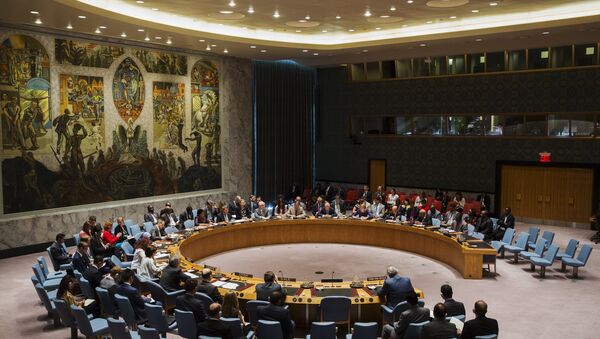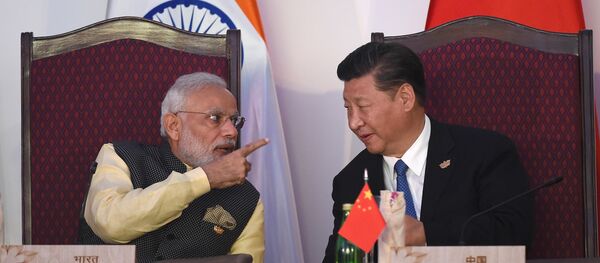MOSCOW (Sputnik) — In June, US President Donald Trump announced that the US would withdraw from the Paris climate deal, which is aimed at alleviating global warming due to the deteriorating environment. The US leader continued by stressing that Washington would pursue the renegotiation of the accord in order to make it more beneficial to the United States.
The move has been widely criticized in the US and abroad.
Climate Change May Be Propelled to UNSC Agenda
The importance of the climate change is growing internationally and given China’s interest in sustainable development, it may well raise the issue at the UN Security Council it will be chairing in July.
"China could certainly take the lead and China is taking the lead in climate change, so I think that they could definitely play a role there, if they choose to use [this] platform for discussing these issues," Tiy Chung, a communications officer with the Climate Clean Air Coalition (CCAC), told Sputnik.
According to Chung, while it is hard to predict what Beijing might do, "given the… security implications of climate change to both security and development," the issue could be addressed, at least to some extent, during China’s presidency.
"It [climate change] is definitely becoming more and more of an important subject in terms of security, in terms of development, the impacts of climate change," Chung said.
Given Washington’s recent withdrawal from Paris Climate Change Agreement and promises made by President Donald Trump to US miners, China may find itself filling the void as one of renewable energy champions.
Possible Ally in France, Opponent in US
Even if China may be more amenable to discussing this issue, there might not be "space" for Beijing to "bring up this agenda," Rae Kwon Chung, the 2007 Nobel Peace Prize laureate and former principal adviser on climate change to UN Secretary-General, told Sputnik.
"In view of President Trump’s position, maybe US might not like to discuss this issue. The situation might not be that favorable for China to bring up this subject," Chung said.
"If we can find one [supporter], it can be France. Because France is pushing the climate issue very hard. The agreement was from Paris. France has some kind of a feeling of ownership of this Paris climate agreement, so it might be France who could raise this issue," Chung underlined.
The expert expressed doubt over any resolutions potentially proposed or adopted during China’s presidency.
"I’m not sure whether [the other UNSC members] will choose to challenge the United States in the Security Council, whether it will be effective or not, because it might backfire," Chung stated.
He suggested that the UNSC members might prefer to discuss the issue informally, "behind the scenes."
The climate change implications for security may thus be discussed, as they have been in the past, within so-called "Arria-formula meetings," informal gatherings with flexible rules.
Beijing Historically Wary of UNSC Climate Change Discussions
Rueanna Haynes, a legal adviser at non-profit climate science and policy research center Climate Analytics, pointed out that China had not been supportive of discussing climate change at the UNSC in the past.
"The Chinese have maintained that the Security Council is not an appropriate forum for the discussion of Climate Change issues given its limited membership and non-recognition of the principle of CBDR RC [Common but Differentiated Responsibilities and Respective Capabilities, a principle acknowledging different degree of responsibility and capability of individual countries in regard to climate change]… I cannot imagine that the impending withdrawal of the United States from the Paris agreement would have changed China's position on this but stranger things have happened," Haynes told Sputnik.
"With the exception of Pacific Small Island Developing States, developing countries have traditionally been less supportive, (preferring to reaffirm the UNFCCC [The United Nations Framework Convention on Climate Change] as the primary forum for the discussion of climate change issues) although in recent years there has been acknowledgment among developing countries of the threat multiplier effect of climate change on international peace and security there is as yet no agreement on what the exact role of the Security Council should be on this issue beyond keeping it in view," Haynes stressed.
Small Island Developing States (SIDS) present an example of climate change becoming a veritable security threat. Sea level rise is one of the gravest dangers to consider in their case. A recent study published in the Nature scientific journal found that the rise of sea level went from 2.2 millimeters per year in 1993 to 3.3 millimeters in 2014, with Greenland ice sheet largely contributing to the increase. According to the National Aeronautics and Space Administration (NASA), sea level rise projections for 2100 vary between 0.2 meters and 2 meters (0.66 to 6.6 feet).
SIDS have been pushing the UNSC toward a more decisive action on the issue for years. This month might show whether China's presidency will help promote their cause.






